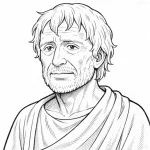“Most powerful is he who has himself in his own power.”

- c. 4 BC – AD 65
- Roman
- Philosopher, Statesman, Dramatist, Stoic Thinker, Advisor to Emperor Nero
table of contents
Quote
“Most powerful is he who has himself in his own power.”
Explanation
Seneca defines true power not as control over others, but as mastery over oneself. In the Stoic worldview, external power—over wealth, status, or people—is fleeting and often deceptive. The person who is truly powerful is the one who is governed by reason, not impulse, and who has discipline over their desires, fears, and emotions. This inner sovereignty is the essence of freedom and strength in Stoic ethics.
In ancient Rome, where displays of authority and dominance were highly prized, Seneca offers a profound counterpoint. To have oneself in one’s own power means to be unshaken by fortune, unmoved by praise or criticism, and immune to the temptations that enslave weaker minds. It is the ability to live consistently with virtue, regardless of the external circumstances.
Today, this quote remains strikingly relevant. In a world that often equates power with influence or visibility, Seneca reminds us that self-control, integrity, and inner peace are the marks of real strength. The person who can choose wisely, resist temptation, and remain calm amid chaos wields the greatest power of all—the power over self, which no one can take away.
Would you like to share your impressions or related stories about this quote in the comments section?

